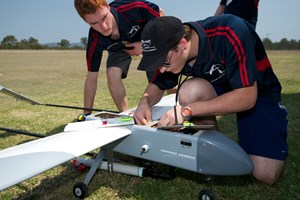Oct 15 2013
Northrop Grumman Corporation is sponsoring the 2013 and 2014 UAV Challenge – Outback Rescue, a competition in which students develop unmanned airborne vehicles (UAVs) that locate and deliver an emergency package to a fictitious lost hiker. The competition is aimed at encouraging growth in the Australian civil UAV industry and raising awareness of the potential civilian applications.
 Dickson College unmanned air vehicle (UAV) teammates work on their aircraft during the UAV Challenge - Outback Rescue in Australia.
Dickson College unmanned air vehicle (UAV) teammates work on their aircraft during the UAV Challenge - Outback Rescue in Australia.
"This competition is significant because it introduces high school and university students to UAV technology and shows them how it can help solve real-world problems," said Ian Irving, Northrop Grumman's chief executive for Australia. "Given our company's leadership in the field of unmanned aircraft systems, we are pleased to be supporting this important initiative, which will help create the next generation of aerospace professionals."
The UAV Challenge – Outback Rescue includes two flying categories: the Airborne Delivery Challenge and the Search and Rescue Challenge. Both competitions give students a hands-on opportunity to explore their interests, whether in project management, engineering, mathematics or technology.
This year's Airborne Delivery Challenge took place Sept. 24-25 at Gratton Field in Calvert, Queensland, with 11 teams of Australian high school students participating. Each team was given an emergency package to be delivered to the lost bushwalker, a mannequin called "Outback Joe." Teams used UAVs they built to carry and drop the package as close to Outback Joe as possible. The delivery of the package was controlled by either a human operator or automatically by the systems on the aircraft. This year's Airborne Delivery Challenge was won by the Calamvale Raptors II team from Queensland.
"The competition experience increased the students' interest in science and technology and encourages them to think about pursuing careers in the aerospace industry," said Jonathan Roberts, co-chair of the UAV Challenge Steering Committee and head judge. "UAVs are of growing importance to Australia given its size. This technology is critical, whether for search and rescue or monitoring bush fires or floods."
An optional Search Phase, in which teams used their aircraft to read symbols left by Outback Joe, was completed for additional points. Each team submitted a technical report on its UAV and gave an oral presentation.
The Search and Rescue Challenge will be held Sept. 22-26, 2014, in Kingaroy, Queensland. This competition, open to university students and amateurs worldwide, also includes developing a UAV that locates Outback Joe and delivers the emergency package to him. For this competition, the UAVs must meet specific size qualifications and teams must put together two technical reports, along with a flight demonstration video. The students submit an autonomous flight record that documents that their UAV has flown autonomously for at least five hours.
The UAV Challenge – Outback Rescue, which began in 2007, is a joint initiative between the Australian Research Centre for Aerospace Automation (a Queensland University of Technology research centre) and CSIRO (Australia's national science agency). It is supported by the Queensland Government, Aviation Development Australia Limited and the Australian Association of Unmanned Systems. Northrop Grumman's involvement started in July 2013 when the company sponsored Dickson College UAV, a team from Dickson College in Canberra.